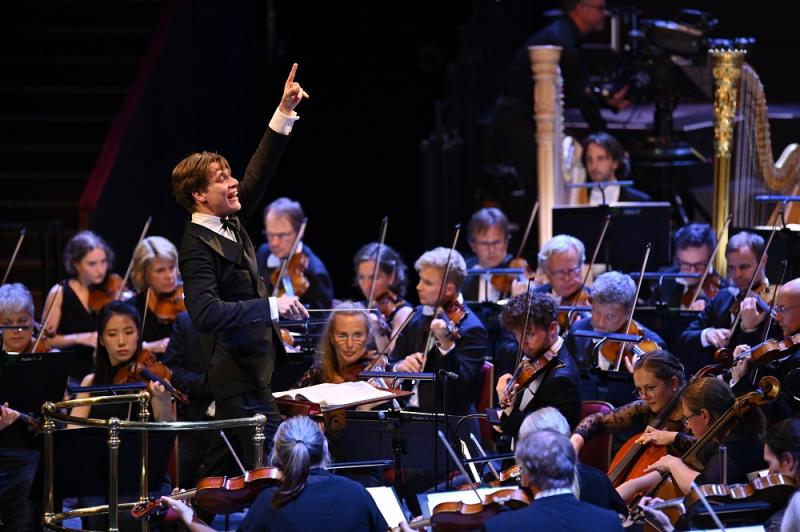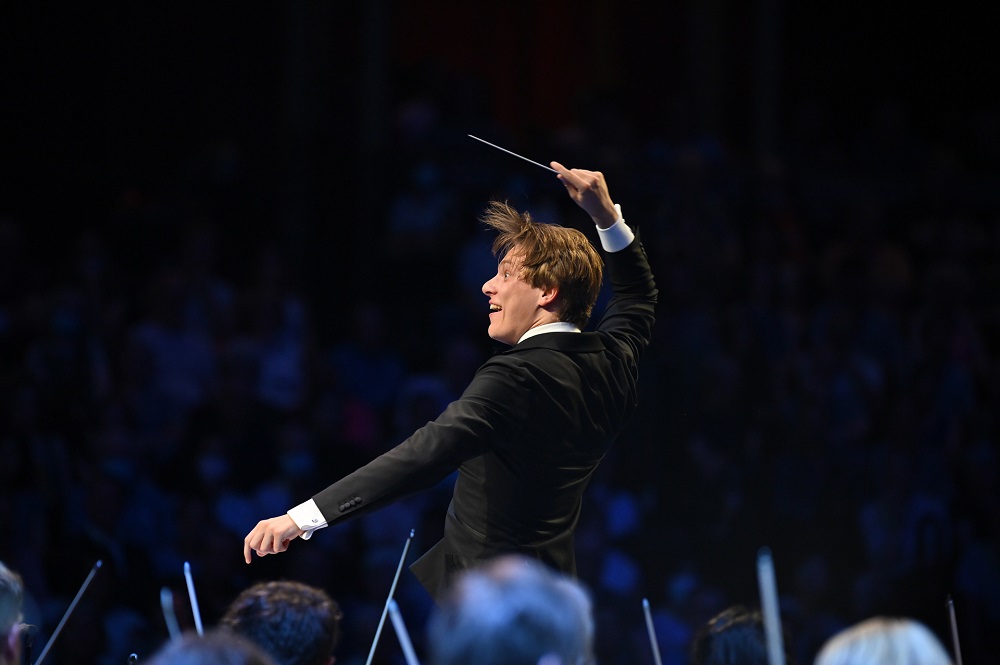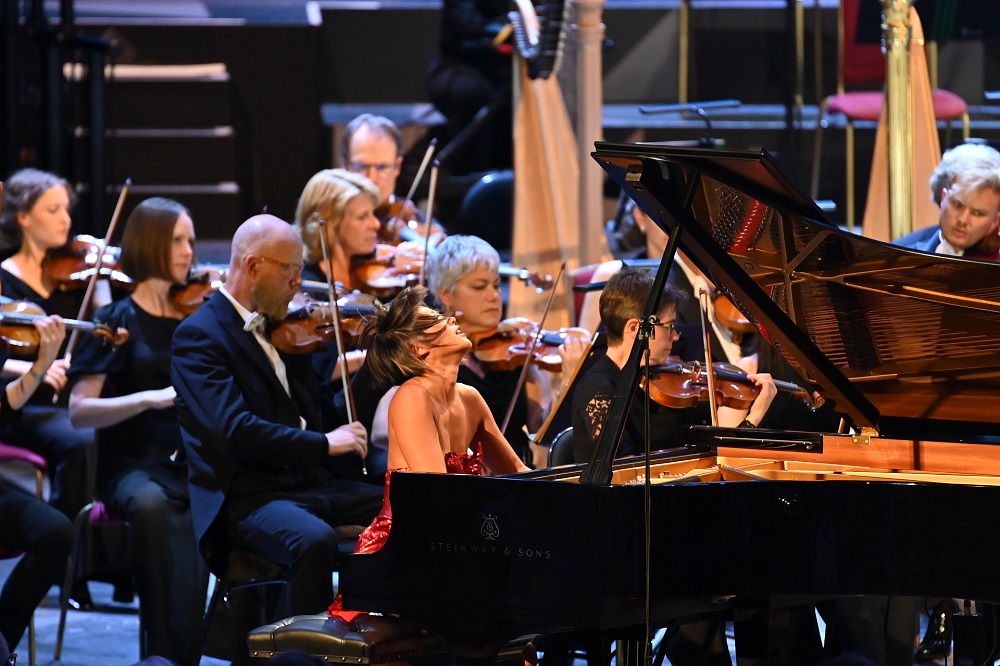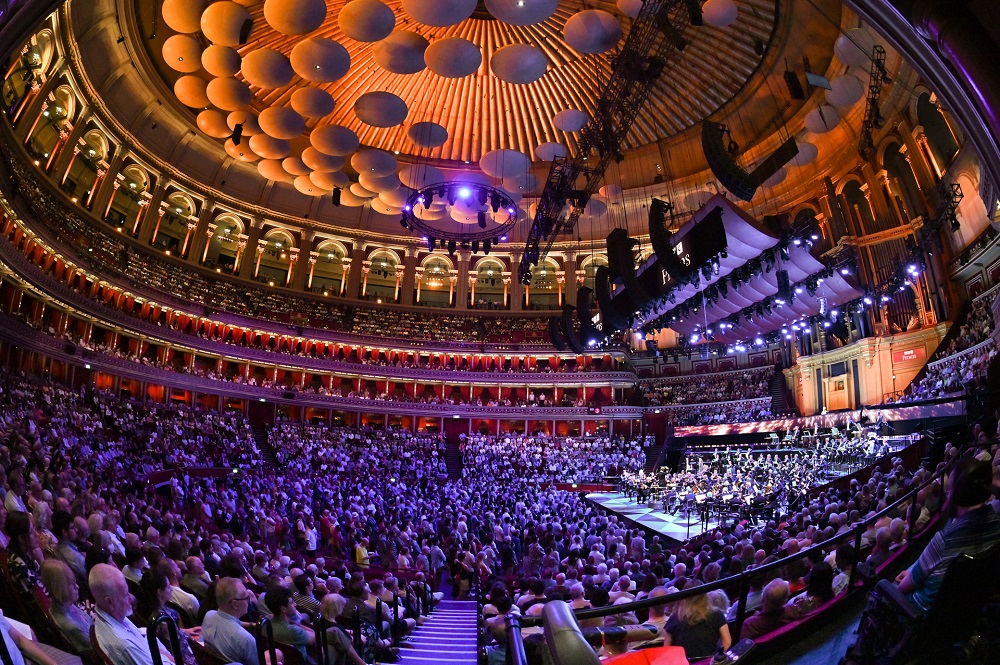Prom 35, Wang, Oslo Philharmonic, Mäkelä review - crystalline fantasy and levitational brilliance | reviews, news & interviews
Prom 35, Wang, Oslo Philharmonic, Mäkelä review - crystalline fantasy and levitational brilliance
Prom 35, Wang, Oslo Philharmonic, Mäkelä review - crystalline fantasy and levitational brilliance
Sibelius goes deepest, but airborne entertainment elevates Liszt and RIchard Strauss

Klaus Mäkelä, 26-year old chief conductor of the Oslo Philharmonic and Orchestre de Paris, lined up for the same role at the Royal Concertgebouw Orchestra in 2027, knows exactly where he’s going: a crucial asset in the idiosyncratic ebb and flow of orchestral oddities by Sibelius and Strauss. So, too, does pianist Yuja Wang; boundless imagination matched to phenomenal technique made something far more fascinating than usual of Liszt’s First Piano Concerto.
If you dwell too much on the age of one – yes, I mentioned it just the once – or the fashion sense of the other – she can wear whatever she damned well pleases – that’s your problem: both are already among the world’s great musicians. I’d also hazard that superlative for the collective brilliance and suppleness of the Oslo Philharmonic. True, it was one thing to be poleaxed at much closer quarters by their Bartók Miraculous Mandarin Suite in their home city and Sibelius 5 at the Barbican, another to decode every profile from near the back of the Royal Albert Hall. But Mäkelä’s high, lucid and bright conducting style, a joy to watch, found its response in every line from those remarkable strings, every brass ensemble and woodwind solo.  Of the three works on the official programme, the most profound was unquestionably Sibelius’s late meditation on the mythic brooding of Finland’s forests, Tapiola, which also comes across as another dark night of the soul (it’s never either/or with this genius). Mäkelä made multi-dimensional work of the extraordinary textures, but even more remarkable was his totally organic fluctuation between hypnotic stasis and spectral dancing; it made me think more than ever that this is a companion piece to Debussy’s late mystery Jeux, which was actually designated as a ballet (Sibelius’s experience in the genre came over a decade before Tapiola in the “pantomime-tragedy” Scaramouche, a work we need to hear in its entirety at the Proms). The storm just before the end rose from near-nothingness to fearsome heights; the final chord which breathes major-key peace at last could hardly have been richer or more resonant.
Of the three works on the official programme, the most profound was unquestionably Sibelius’s late meditation on the mythic brooding of Finland’s forests, Tapiola, which also comes across as another dark night of the soul (it’s never either/or with this genius). Mäkelä made multi-dimensional work of the extraordinary textures, but even more remarkable was his totally organic fluctuation between hypnotic stasis and spectral dancing; it made me think more than ever that this is a companion piece to Debussy’s late mystery Jeux, which was actually designated as a ballet (Sibelius’s experience in the genre came over a decade before Tapiola in the “pantomime-tragedy” Scaramouche, a work we need to hear in its entirety at the Proms). The storm just before the end rose from near-nothingness to fearsome heights; the final chord which breathes major-key peace at last could hardly have been richer or more resonant.
Though Liszt has his moments with orchestral solos in the concerto, gleamingly taken by the Oslo Philharmonic wind and cello principals, the magic is nearly all in the piano writing (famously there's a triangle part which should reverberate in a pause, but couldn't be heard from my seat for the first minute of its role).. Transcendentalism took on a new meaning in Wang’s hands; one plunge from a dizzying trill seemed positively supernatural. Yes, she can fire fiercely in double octaves, but it was the making-fresh, the improvisational feel, of what thematic riches there are in this compact concerto. Even playing on the verge of silence drew us in from far away thanks to the crystalline clarity of the rarest, most precious piano sound. What in fellow pianist Khatia Buniatishvili is so often mannered and eccentric-grotesque made total if surprising sense here; and it says so much for Wang’s place among the half-dozen top league players that when Argerich and Barenboim performed this work at the Proms, the aftermath left an “is that all there is?” feeling. This was mesmeric at every turn; Mäkelä and his orchestra kept tabs with equal subtlety and freedom.  The encores scintillated too: pure virtuoso high jinks and sleight-of-hand(s) in the "Danse Bohème" from Bizet's Carmen as elaborated by Horowitz, perfectly balanced by reflection that drew you ever more closely in to the centre in that soul-piercing part of Gluck's "Dance of the Blessed Spirits" he added after the first performances of Orfeo ed Euridice (purist productions which stick to the 1762 original miss perhaps the most other-worldy part of the entire score), No amount of extra notes added in Sgambati's transcription got in the way of the essence, proving again that Wang is no mere virtuoso but an imaginative artist of the highest order,
The encores scintillated too: pure virtuoso high jinks and sleight-of-hand(s) in the "Danse Bohème" from Bizet's Carmen as elaborated by Horowitz, perfectly balanced by reflection that drew you ever more closely in to the centre in that soul-piercing part of Gluck's "Dance of the Blessed Spirits" he added after the first performances of Orfeo ed Euridice (purist productions which stick to the 1762 original miss perhaps the most other-worldy part of the entire score), No amount of extra notes added in Sgambati's transcription got in the way of the essence, proving again that Wang is no mere virtuoso but an imaginative artist of the highest order,
If Wang worked wonders on a concerto warhorse, I was hoping to love Strauss's Ein Heldenleben more in the hands of flaming youth (it's my least favourite of the symphonic poems other than Macbeth, at least until the Hero's Homecoming). Even Mäkelä and the Oslo Phil couldn't do that for me, but this could hardly have been a classier sweep through the mock-epic world of the composer as hero, moving forward but never over-urged, gauzes placed magically over the post-coital repose between love scene and battle as well as the early stages in the review of the Works of Peace - self-quotations in the loveliest tapestry possible, all clear in this interpretation - and the hero's withdrawal from the world. I can't agree with my colleague Graham Rickson, who writes in today's reviews column that "the work’s second half can drag"; it's precisely here, surely, that our hero wins the laurels he hasn't up to that point really deserved, and Mäkelä elevated the celebration of enemy-critics routed with more high style.  Even so, we'd had all the movement we needed in the peculiar early stages, above all from leader Elise Båtnes' tough and note-perfect portrait of the feisty companion.. She contributed to the elevation of the final stages with a tender presence more remarkable than any I've heard before. Båtnes, incidentally, is just as fine in the orchestra's recording of the work with previous chief conductor Vasily Petrenko, part of an excellent Strauss series. Petrenko was in the audience (full house, pictured above) to see his old friends; lucky (or rather discriminating) orchestra to keep on soaring with its music directors - dare I say it to even greater heights under Mäkelä. The encore, Johann Strauss II's Csárdás from Ritter Pázmán, showcased string fire and the conductor's easy flexibility. If there's a flaw in this marvellous team I haven't encountered it yet.
Even so, we'd had all the movement we needed in the peculiar early stages, above all from leader Elise Båtnes' tough and note-perfect portrait of the feisty companion.. She contributed to the elevation of the final stages with a tender presence more remarkable than any I've heard before. Båtnes, incidentally, is just as fine in the orchestra's recording of the work with previous chief conductor Vasily Petrenko, part of an excellent Strauss series. Petrenko was in the audience (full house, pictured above) to see his old friends; lucky (or rather discriminating) orchestra to keep on soaring with its music directors - dare I say it to even greater heights under Mäkelä. The encore, Johann Strauss II's Csárdás from Ritter Pázmán, showcased string fire and the conductor's easy flexibility. If there's a flaw in this marvellous team I haven't encountered it yet.
rating
Share this article
Add comment
The future of Arts Journalism
You can stop theartsdesk.com closing!
We urgently need financing to survive. Our fundraising drive has thus far raised £49,000 but we need to reach £100,000 or we will be forced to close. Please contribute here: https://gofund.me/c3f6033d
And if you can forward this information to anyone who might assist, we’d be grateful.

Subscribe to theartsdesk.com
Thank you for continuing to read our work on theartsdesk.com. For unlimited access to every article in its entirety, including our archive of more than 15,000 pieces, we're asking for £5 per month or £40 per year. We feel it's a very good deal, and hope you do too.
To take a subscription now simply click here.
And if you're looking for that extra gift for a friend or family member, why not treat them to a theartsdesk.com gift subscription?
more Classical music
 Bizet in 150th anniversary year: rich and rare French offerings from Palazzetto Bru Zane
Specialists in French romantic music unveil a treasure trove both live and on disc
Bizet in 150th anniversary year: rich and rare French offerings from Palazzetto Bru Zane
Specialists in French romantic music unveil a treasure trove both live and on disc
 Scottish Chamber Orchestra, Ibragimova, Queen’s Hall, Edinburgh review - rarities, novelties and drumrolls
A pity the SCO didn't pick a better showcase for a shining guest artist
Scottish Chamber Orchestra, Ibragimova, Queen’s Hall, Edinburgh review - rarities, novelties and drumrolls
A pity the SCO didn't pick a better showcase for a shining guest artist
 Kilsby, Parkes, Sinfonia of London, Wilson, Barbican review - string things zing and sing in expert hands
British masterpieces for strings plus other-worldly tenor and horn - and a muscular rarity
Kilsby, Parkes, Sinfonia of London, Wilson, Barbican review - string things zing and sing in expert hands
British masterpieces for strings plus other-worldly tenor and horn - and a muscular rarity
 From Historical to Hip-Hop, Classically Black Music Festival, Kings Place review - a cluster of impressive stars for the future
From quasi-Mozartian elegance to the gritty humour of a kitchen inspection
From Historical to Hip-Hop, Classically Black Music Festival, Kings Place review - a cluster of impressive stars for the future
From quasi-Mozartian elegance to the gritty humour of a kitchen inspection
 Shibe, LSO, Adès, Barbican review - gaudy and glorious new music alongside serene Sibelius
Adès’s passion makes persuasive case for the music he loves, both new and old
Shibe, LSO, Adès, Barbican review - gaudy and glorious new music alongside serene Sibelius
Adès’s passion makes persuasive case for the music he loves, both new and old
 Anja Mittermüller, Richard Fu, Wigmore Hall review - a glorious hall debut
The Austrian mezzo shines - at the age of 22
Anja Mittermüller, Richard Fu, Wigmore Hall review - a glorious hall debut
The Austrian mezzo shines - at the age of 22
 First Person: clarinettist Oliver Pashley on the new horizons of The Hermes Experiment's latest album
Compositions by members of this unusual quartet feature for the first time
First Person: clarinettist Oliver Pashley on the new horizons of The Hermes Experiment's latest album
Compositions by members of this unusual quartet feature for the first time
 Gesualdo Passione, Les Arts Florissants, Amala Dior Company, Barbican review - inspired collaboration excavates the music's humanity
At times it was like watching an anarchic religious procession
Gesualdo Passione, Les Arts Florissants, Amala Dior Company, Barbican review - inspired collaboration excavates the music's humanity
At times it was like watching an anarchic religious procession
 Classical CDs: Camels, concrete and cabaret
An influential American composer's 90th birthday box, plus British piano concertos and a father-and-son duo
Classical CDs: Camels, concrete and cabaret
An influential American composer's 90th birthday box, plus British piano concertos and a father-and-son duo
 Cockerham, Manchester Camerata, Sheen, Martin Harris Centre, Manchester review - re-enacting the dawn of modernism
Two UK premieres added to three miniatures from a seminal event of January 1914
Cockerham, Manchester Camerata, Sheen, Martin Harris Centre, Manchester review - re-enacting the dawn of modernism
Two UK premieres added to three miniatures from a seminal event of January 1914
 Kempf, Brno Philharmonic, Davies, Bridgewater Hall, Manchester review - European tradition meets American jazz
Bouncing Czechs enjoy their Gershwin and Brubeck alongside Janáček and Dvořák
Kempf, Brno Philharmonic, Davies, Bridgewater Hall, Manchester review - European tradition meets American jazz
Bouncing Czechs enjoy their Gershwin and Brubeck alongside Janáček and Dvořák
 Solomon, OAE, Butt, QEH review - daft Biblical whitewashing with great choruses
Even a top soprano and mezzo can’t make this Handel paean wholly convincing
Solomon, OAE, Butt, QEH review - daft Biblical whitewashing with great choruses
Even a top soprano and mezzo can’t make this Handel paean wholly convincing

Comments
New to Sibelius’ Tapiola I
While it's strictly true that